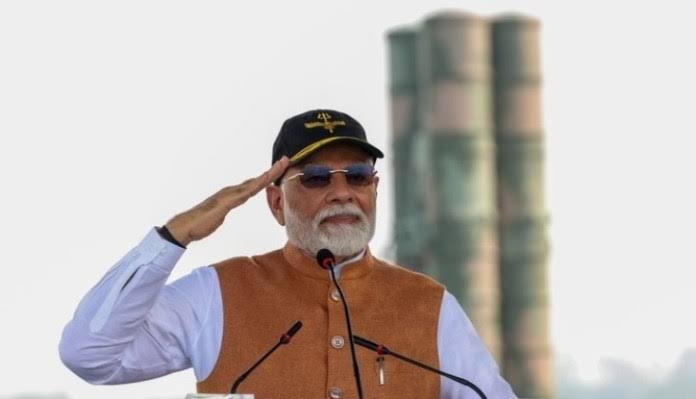Following ‘Operation Sindoor’, Middle Eastern powers set their alliances

The days of equating India with Pakistan is long over but the Yanks just don’t seem to get it. So Washington’s simultaneous support for both India and Pakistan during OP Sindoor, has once again tripped it flat on the ground, face first. in case they continue doing this then soon New Delhi will start offering mediation for any USA – North Korea conflict too.
The crafty Britishers – the GREAT GAME players carried out a virtual “nuclear strike” by partioning the Indian subcontinent into India and Pakistan in 1947. As part of this seismic geopolitical chaos was the Kashmir drama played by Maharaja Hari Singh, Jinnah, Nehru and the two British Commander in Chiefs on either side.
A year later, the Brits in league with the Yanks carried out another upheaval by establishing the State of Israel not in Europe or North America but bang along the Jordan Valley. Since then both South Asia and the Middle East—remain perilously active, threatening to reignite at the slightest provocation
Recent punishment meted out to Pakistan following the April 22 terrorist attack in Pahalgam that killed 26 innocent tourists, have re set the World’s power politics.
India’s determined “Operation Sindoor,” involving missile strikes on terrorist sites in Pakistan, marked a new chapter for India, a rising world power and also re wrote the rules of the game of fighting a nuclear-armed neighbor.
The ripple effects of this punishment by India has rattled not only USA, China and Western Europe – because India didn’t bother to even say EXCUSE ME to these self appointed World Regulators – but extend far beyond South Asia, to Middle Eastern and Caucasian powers that is going to evolve into new complex alliances.
Israel as usual has firmly backed India. Erdogan the self styled Khalifa of Turkey along with Azerbaijan has given unwavering support to Pakistan. The famed Turkish drones ex Ukraine Conflict were swatted like fireflies by the Indian Air defence system. Now both Turkey and Azerbaijan are shivering as Greece and Armenia are already looking up to further strengthening their ties with India.
Significantly enough, the Pahalgam attack, also saw New Delhi suspend the Indus Waters Treaty, a rare symbol of cooperation that had endured decades of hostility and the potential hydro political implications are mind-blowing. Islamabad as a response also withdrew from the 1972 Shimla Agreement, a peace treaty—further cutting its own legs.
The precision missile strikes on terror sites inside Pakistan totally took the Pakis by a surprise and they tried a massive strike on Indian border areas with modern military Turkish drones and Chinese missiles, Chinese and American made jets and raised the stakes. They thought that after their strike India will hesitate to counter because of the nuclear spectre.
Instead India not only fended off the entire offensive but once again struck, this time swatting the PAF bases using super deadly BRAHMOS and Scalp missiles, totally paralyzing and devastating the Pakistan Air defences and bases. USA, China, Western Europe all were left speechless and in shock too.
Middle Eastern powers in turn have not remained unaffected in this crisis. Israel, a steadfast ally of India, quickly endorsed Operation Sindoor, with Ambassador Reuven Azar affirming New Delhi’s “right to self-defense” against terrorism. This solidarity is unsurprising, given the deepening India-Israel strategic partnership, particularly in defense and technology. India’s use of Israeli-made Harop drones in strikes on Pakistan underscores their military collaboration.
Moreover, Israel’s support aligns with its broader geopolitical strategy, viewing India as a counterweight to regional adversaries and a partner in combating Islamic militancy. This alignment strengthens New Delhi’s position, bolstering its ability to project power while navigating international pressures to respond decisively to terrorism.
Conversely, Turkey’s role in this conflict is, to put it simply, suicidal. Ankara’s unwavering support for Islamabad, including the supply of 300-400 Asisguard Songar drones used along the Line of Control, has exposed its hardware fully. Turkish President Recep Tayyip Erdogan’s vocal backing of Pakistan, praising only emboldens Islamabad’s stance.
Turkey’s actions (even before the ongoing escalation) reflected its ambitions to assert influence in South Asia too, leveraging its defense exports and ideological alignment with Pakistan to challenge India’s dominance. Turkey’s strong support for Pakistan is rooted in shared Islamic identity and historic defense ties.
All this has been vaporized with even Indonesia and Malaysia backing India.
Azerbaijan’s alignment with Pakistan and Baku’s official support for Islamabad, expressed during the recent clashes, aligns with its strategic partnership with Turkey and its refusal to recognize Armenia, a stance Pakistan shares.
India’s response to these entanglements has been measured yet firm. By forging partnerships with Greece and Armenia, India arguably counters the Turkey-Pakistan-Azerbaijan axis, in the Caucasus.
Now with spurt in Indian military exports to Armenia, Baku will not know what it has been hit with. Similarly there will be up gradation of defence ties between Greece and India. Turkey’ exports to India has been hit severely and it is losing all the tourist inflow from India in addition.
Turkish support for Pakistan aligns with its rivalry against Saudi Arabia and the UAE, which have sought to mediate between India and Pakistan to stabilize the region.
The Gulf Cooperation Council’s cautious calls for de-escalation contrast sharply with Turkey’s provocative actions, highlighting competing visions for influence in South Asia. Meanwhile, Israel’s backing of India strengthens its strategic foothold in Asia.
Though Pakistan has used Chinese made weapons and exposing them as nearly useless, both the Shanghai Cooperation Organization (SCO) and BRICS, despite their limitations, could still play a pivotal role in making Pakistan a terrorist free country, considering that India now no more cares for any US-led Western mediation.




